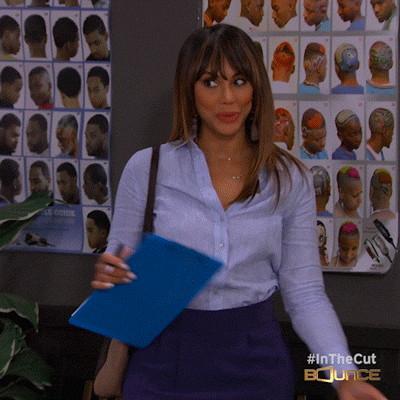
It can be super-awkward talking to your bae about anything sexual, especially if it's a touchy subject like not being in the mood for sex. Staying on-ready can seem essential to keeping things fresh, and as women, we can sometimes feel obligated to please on demand.
Here are a few tips—from research and my own experience—to get through those moments when you're not in the mood:
Create A Mood Tracker

Write down your feelings and document instances. I tried this and found that oftentimes I wasn't in the mood simply because of timing. I'm in a long-distance relationship, and due to differences in time zones, he'd get off work hours after I'd already been home and settled, so I'd be in sleep mode. I became more deliberate about scheduling time with bae or maybe getting an early nap in to stay up late at least one night a week with him.
If you review what you've written down and find that you're not in the mood due to unhealthy arguments, abuse, side effects of a medication, or simple indifference, you may need to seek help from a therapist or doctor or leave the relationship altogether.
Set The Mood With A Slow Jam

Amp yourself up with music, films or anything that will boost arousal or confidence. Studies show that dopamine is released in the brain when we participate in activities that feel good to us. That same dopamine can contribute to attraction to your partner. I enjoy a good Sade, Janet Jackson, or Vybz Kartel (don't judge me) mix. Watch an episode of She's Gotta Have It, or light a great-smelling candle to get in the mood a bit more. Whatever gets you going, try it before getting started with bae. If it's something that both of you can enjoy together in order to pop things off, by all means, include bae and make it fun.
Be More Intentional About Foreplay

Don't assume bae just knows how to get the party started, even if you've been in a relationship for a while. Tell bae how to get you in the mood, or take matters into your own hands and beat your partner to initiating sex. Play games that ask questions about positions, fantasies or preferences, or find ways to demonstrate how you like to be touched or handled before sex. For some, foreplay may have nothing to do with anything physical—maybe reading, engaging in debate, or enjoying your partner doing something useful turns you on—but be sure to take action and let bae know how to get you ready for intimacy.
Just Say "No"

If all else fails, just flat-out tell bae, "No". Add an apology at the beginning to lighten the tone of what you're about to say but just be honest. You have the right to say "no", and you should never feel pressured to have sex or fake an orgasm. I was once recovering from fibroid surgery and had clearance from the doctor to have sex but still wasn't in the mood. I felt tired and just not myself for a while. I was straight-up with my man about how I felt, let him know I love him and asked for a bit more time. He totally understood, and a true partner who loves and cares about you will, too.
His patience with me actually made things that much more lit when we did have sex, and to be honest, it's what really consistently turns me on about my fiance—his patience, sense of self, trustworthiness, and his stance on sex. He truly believes (and shows through action) that my satisfaction, health, and happiness matters.
Featured image by Shutterstock.
Want more stories like this? Sign up for our newsletter here and check out the related reads below:
Motherhood Made Me Lose My Sex Drive
My Sex Drive Has Become Super Low & I'm Here For It
How I Took My Power Back After Fibroids Crashed My 35th Birthday
Self-Pleasure Changed How I Experience Sex
- Are you in a sex slump? The 20 reasons you're just not in the mood ... ›
- How To Stay Motivated When You're Not In The Mood To Do Anything ›
- How to have great sex when you're not in the mood - SMR Nation - ›
- What to Do When You're Not in the Mood - Susan Merrill ›
- How to Get in the Mood for Sex When You're Not Feeling It ›
- Not in the Mood? How to Get Your Groove Back ›
- 4 Things You Can Do When You're Not in the Mood - iMom ›
- Should you have sex when you're not in the mood for the sake of ... ›
Exclusive: Viral It Girl Kayla Nicole Is Reclaiming The Mic—And The Narrative
It’s nice to have a podcast when you’re constantly trending online. One week after setting timelines ablaze on Halloween, Kayla Nicole released an episode of her Dear Media pop culture podcast, The Pre-Game, where she took listeners behind the scenes of her viral costume.
The 34-year-old had been torn between dressing up as Beyoncé or Toni Braxton, she says in the episode. She couldn’t decide which version of Bey she’d be, though. Two days before the holiday, she locked in her choice, filming a short recreation of Braxton’s “He Wasn’t Man Enough for Me” music video that has since garnered nearly 6.5M views on TikTok.
Kayla Nicole says she wore a dress that was once worn by Braxton herself for the Halloween costume. “It’s not a secret Toni is more on the petite side. I’m obsessed with all 5’2” of her,” she tells xoNecole via email. “But I’m 5’10'' and not missing any meals, honey, so to my surprise, when I got the dress and it actually fit, I knew it was destiny.”
The episode was the perfect way for the multihyphenate to take control of her own narrative. By addressing the viral moment on her own platform, she was able to stir the conversation and keep the focus on her adoration for Braxton, an artist she says she grew up listening to and who still makes her most-played playlist every year. Elsewhere, she likely would’ve received questions about whether or not the costume was a subliminal aimed at her ex-boyfriend and his pop star fiancée. “I think that people will try to project their own narratives, right?” she said, hinting at this in the episode. “But, for me personally – I think it’s very important to say this in this moment – I’m not in the business of tearing other women down. I’m in the business of celebrating them.”
Kayla Nicole is among xoNecole’s It Girl 100 Class of 2025, powered by SheaMoisture, recognized in the Viral Voices category for her work in media and the trends she sets on our timelines, all while prioritizing her own mental and physical health. As she puts it: “Yes, I’m curating conversations on my podcast The Pre-Game, and cultivating community with my wellness brand Tribe Therepē.”
Despite being the frequent topic of conversation online, Kayla Nicole says she’s learning to take advantage of her growing social media platform without becoming consumed by it. “I refuse to let the internet consume me. It’s supposed to be a resource and tool for connection, so if it becomes anything beyond that I will log out,” she says.
On The Pre-Game, which launched earlier this year, she has positioned herself as listeners “homegirl.” “There’s definitely a delicate dance between being genuine and oversharing, and I’ve had to learn that the hard way. Now I share from a place of reflection, not reaction,” she says. “If it can help someone feel seen or less alone, I’ll talk about it within reason. But I’ve certainly learned to protect parts of my life that I cherish most. I share what serves connection but doesn’t cost me peace.
"I refuse to let the internet consume me. It’s supposed to be a resource and tool for connection, so if it becomes anything beyond that I will log out."

Credit: Malcolm Roberson
Throughout each episode, she sips a cocktail and addresses trending topics (even when they involve herself). It’s a platform the Pepperdine University alumnus has been preparing to have since she graduated with a degree in broadcast journalism, with a concentration in political science.
“I just knew I was going to end up on a local news network at the head anchor table, breaking high speed chases, and tossing it to the weather girl,” she says. Instead, she ended up working as an assistant at TMZ before covering sports as a freelance reporter. (She’s said she didn’t work for ESPN, despite previous reports saying otherwise.) The Pre-Game combines her love for pop culture and sports in a way that once felt inaccessible to her in traditional media.
She’s not just a podcaster, though. When she’s not behind the mic, taking acting classes or making her New York Fashion Week debut, Kayla Nicole is also busy elevating her wellness brand Tribe Therepē, where she shares her workouts and the workout equipment that helps her look chic while staying fit. She says the brand will add apparel to its line up in early 2026.
“Tribe Therepē has evolved into exactly what I have always envisioned. A community of women who care about being fit not just for the aesthetic, but for their mental and emotional well-being too. It’s grounded. It’s feminine. It’s strong,” she says. “And honestly, it's a reflection of where I am in my life right now. I feel so damn good - mentally, emotionally, and physically. And I am grateful to be in a space where I can pour that love and light back into the community that continues to pour into me.”
Tap into the full It Girl 100 Class of 2025 and meet all the women changing game this year and beyond. See the full list here.
Featured image by Malcolm Roberson
There is a very specific reason why I decided to write this article before the holiday season officially gets underway. It’s because I once read a study that said it’s quite common for most Americans to double the amount of alcohol that they consume between Thanksgiving and New Year’s Day.
It makes sense when you stop to think about all of the holiday parties, time off, and moments spent with loved ones that transpire around this time of year. And while there is certainly nothing wrong with enjoying some mulled wine, real-deal eggnog, or peppermint martinis, because your health is something that never “takes a vacation,” I thought it was important to share with you some of the benefits (pros) and challenges (cons) that can arise from alcohol consumption.
My main motive? Mostly, I hope that it will serve as a solid reminder to embrace all of the things that you adore about this time of year, so long as you do it in moderation and you weigh the costs.
Especially as far as drinking alcohol is concerned.
PRO: Manages Blood Sugar Levels
 Giphy
GiphyHere’s something that you may have never seen coming. Were you aware of the fact that alcohol can actually help to stabilize your blood sugar? Yep, according to the American Diabetes Association, so long as you leave it to no more than 1-2 cocktails a day, alcohol may be able to lower your A1C levels. Pretty cool, right?
CON: It’s a Carcinogen
 Giphy
GiphyAlcohol is a carcinogen. The reason why this should somewhat alarm you is because carcinogens are things (like tobacco, UV rays, processed meats, etc.) that can increase your chances of being diagnosed with cancer (especially mouth, throat, esophagus, stomach and breast cancer). There are various ways this happens including the fact that alcohol, specifically, can hinder your body from breaking down certain nutrients, it can cause your estrogen levels to spike and alcohol can also cause certain toxins to damage your DNA and certain bodily proteins over time.
PRO: Cultivates Euphoric Feelings
 Giphy
GiphyIf you find yourself feeling more euphoric while you’re enjoying a drink, it’s not all up in your head. Although, for the more part, alcohol is considered to be a depressant, when consumed in small amounts, it can provide a stimulant effect. This happens due to the fact that when you first start to consume alcohol, it causes the production of the feel-good hormone known as dopamine to increase — and since dopamine makes us all feel more relaxed and confident while heightening our senses of pleasure too…well, there you have it.
CON: May Increase Anxiety/Depression
 Giphy
GiphyAs they say, “what goes up, most come down” at some point — and that is what you have to be careful of when it comes to alcohol consumption. For instance, when you drink alcohol, although it tends to initially cause your dopamine levels to uptick, because it is a temporary bodily response, sometimes the dips are lower than the rises…and that is when anxiety starts to kick in. A similar point is made with depression because oftentimes, people with depression-related symptoms, will use alcohol as a way to deflect from what’s really going on with them — and that can make them feel even worse than ever once the buzz of alcohol starts to wear off.
PRO: Has Some Heart-Related Benefits
 Giphy
GiphyWhen it comes to your heart, there are interesting findings surrounding its relationship to alcohol. For instance, some research states that, so long as the consumption is moderate, alcohol can actually help to increase the good cholesterol in your system while also breaking down proteins that can potentially lead to blood clots; both of these factors alone can reduce your chances of dying from heart disease.
CON: Packs on Pounds
 Giphy
GiphyIt’s no secret that alcohol tends to contain quite a few calories. That’s why, it’s not uncommon for people who’ve lost weight to mention “I’ve stopped drinking” as one of the causes for the shed pounds. That’s not to say that there aren’t some alcoholic beverages that have less calories than others including vodka (133 calories per serving), white wine (148 calories per serving) and tequila (99 calories per shot). Just keep in mind that the more you drink, the more calories get into your system and the more weight you stand to gain.
PRO: Lowers Inhibitions
 Giphy
GiphyAlthough you really should only be uninhibited around people who you absolutely trust, if that person is your partner and you’re looking to have a pretty — eh hem — active evening, alcohol can certainly help to make that happen. The science of it all is the prefrontal cortex of your brain is what regulates your inhibitions and levels of self-control. Meanwhile, alcohol suppresses your inhibitions which can cause you to be more spontaneous and open to trying things that you might not immediately do if you were sober. And with the right individual, that can be sexually beneficial (emphasis on “right person”).
CON: Makes It Harder to Orgasm
 Giphy
GiphyOn the other hand, as odd as it may seem (in light of what I just said), if you have too much alcohol in your system, it could make climaxing difficult. That’s because orgasms happen, in part, due to your nervous system being stimulated — and since alcohol is technically a depressant…well, it could reduce nerve sensitivity (especially as far as your clitoris goes) for you while making it challenging for your partner to remain erect or have consistent stamina. And yeah, that sucks.
____
‘Tis the season. And with that, if some wassails or hot buttered rums are in your immediate future — hey, don’t let me stop you — not even a lil’ bit.
All I’m saying is now that you know what alcoholic drinks have to offer (both ways), you can know exactly how to incorporate them into your holiday plans. Enjoy!
Let’s make things inbox official! Sign up for the xoNecole newsletter for love, wellness, career, and exclusive content delivered straight to your inbox.
Featured image by Unsplash









